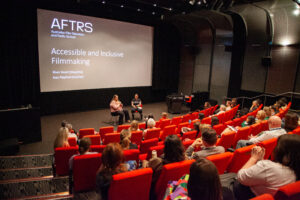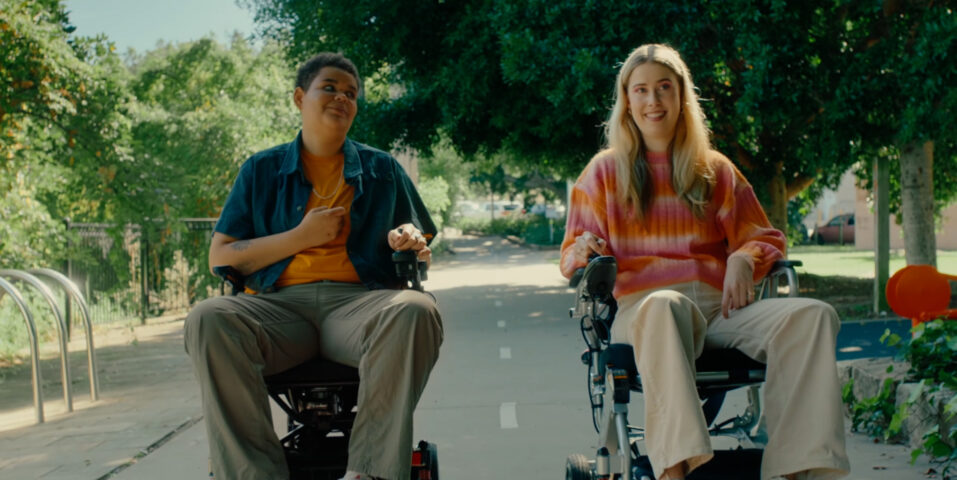Today, December 3rd, we celebrate International Day of People with Disability, marking AFTRS’ commitment to inclusion in every aspect of the School’s operations.
At AFTRS, this means improving accessibility and inclusion protocols around people, spaces, practice and engagement, from enabling equitable employment to fostering inclusive teaching and learning and creating accessible physical and digital environments. The School’s continuous commitment is an essential part of AFTRS’ Creating the Future Strategy, to ensure AFTRS is an inclusive place for staff, students, and visitors with disabilities and incorporates principles of accessibility.
The Disability Action Plan 2024–2027 (DAP), launched in October, is an integral part of this pledge and delivers a comprehensive roadmap designed to integrate accessibility, equity, and inclusion into every facet of the School’s operations. The plan was officially launched at an event hosted by AFTRS CEO Dr. Nell Greenwood and Director of People & Culture Sharon Zeeman.
Built upon the School’s earlier Accessibility Action Plan 2018–2020 and in consultation with key stakeholders, including staff, students, and alumni living with disabilities, DAP was developed under the guidance of the AFTRS Accessibility Working Group in partnership with Accessible Arts NSW, to incorporate principles of universal design, setting a benchmark for best practices in the creative industries.

A launch highlight was a fireside chat between AFTRS Industry Manager (Students) River Heart and alum Inez Playford, who are both passionate advocates for accessible and inclusive filmmaking.
The conversation focused on the transformative power of inclusion in creative spaces, highlighting the essential role accessibility plays in fostering innovation and talent, and the power of making access services central to any set or production office. Inez shared insights about shooting her MAS short film, Rehabilitating, with an inclusive crew and practice. Inez and River spoke about the need to encourage the crew to be upfront with the adjustments they need to do their best work, and to remember that the majority of people with a disability have invisible disability. In an industry where shoot days are long and conditions often difficult, they framed accessibility as a principle that can benefit all crews’ wellbeing.
It was a great way to celebrate this year’s theme for International Day of People with a Disability, “Amplifying the leadership of persons with disabilities for an inclusive and sustainable future.”
Paving the way for disabled representation on and off screen, Inez’ film is one example of AFTRS’ ongoing commitment to accessible productions. Another is its support of Accessible Arts’ Screen Access and Inclusion Masterclasses, as well as the Access Coordinator Training Program, developed by Screen Australia. The latter equips professionals with the skills to embed accessibility across all aspects of production, ensuring inclusion becomes a standard practice within the industry.
To champion high standards in inclusive screen practices, AFTRS joined Inclusively Made’s Inclusion in Production Alliance, committing to supporting (and learning from) organisations driving disability inclusion in the screen industries.
Other accessibility initiatives include a collaboration with RCS to improve accessibility in radio studios and Re-imagining Accessibility presented on NITRO + Creative Matters, a framework on production practices presented by River, voicing their experience in the context of broader lived experiences of filmmakers with a disability, providing valuable lessons for the screen industry to re-evaluate ‘business as usual’.
In River’s words, “As an industry teeming with innovators, designers, and imaginers, we need to be more creative in the ways we imagine not only accessibility but disability justice and disabled futures.”
Available data shows that people with disability include only 5.3% of the Australian production crew despite making up 17.7% of the general population (Screen Diversity and Inclusion Network 2022). Exploring the future of meaningful inclusion for filmmakers with disability and fostering industry-wide awareness and collaboration is essential to tap into the transformative potential of accessibility in the screen industry, sparking conversations and collaborations to drive systemic change.
At the School, 16% of students and 13% of staff identify has having a disability or being neurodivergent. Embedding accessibility into everything we do is essential to our future planning at AFTRS. The Disability Action Plan is not just a document, it’s a call to action for meaningful inclusion, with its principles integrated into processes across the School.
Current initiatives include making our website and social media more accessible (guided by WCAG 2.2 standards), installing more automatic doors across campus to facilitate wheelchair access, and providing AUSLAN interpreters and access services to people with low or no vision in selected short courses.
In 2025, AFTRS will also award the inaugural Dylan Alcott Foundation Scholarship for a student joining the Bachelor of Arts: Screen Production, part of our support to young Australians living with a disability or long-term illness to overcome the barriers to education and fulfil their creative dreams and goals.
Learn more about the Disability Action Plan 2024–2027 here.
